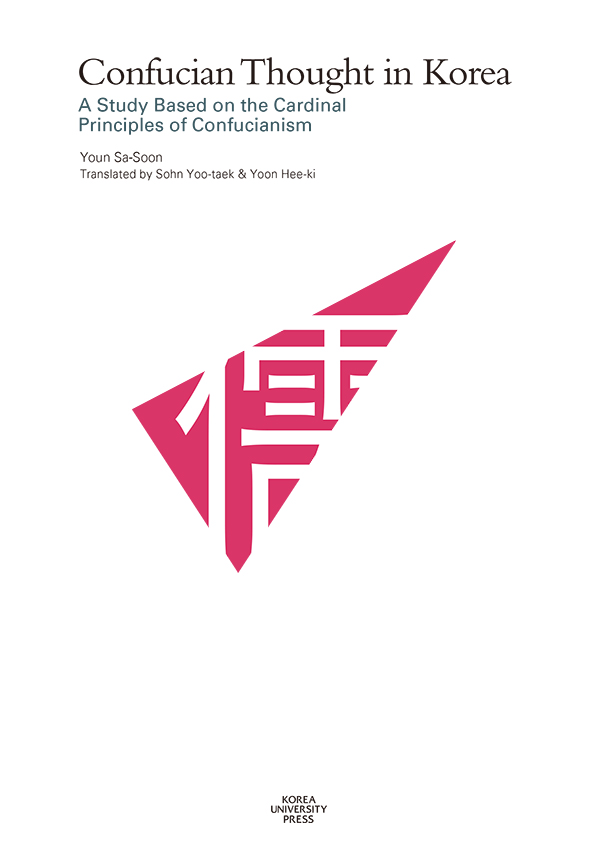유학의 근본 원리는 어느 나라 유학이냐를 막론하고 ‘유학 자체의 사상’을 이루는 근본 요인이다. 그런 만큼 ‘한국의 유학사상’이란 한국의 유학자들이 그 근본 원리를 지난날 한국의 각 실정(환경)들에 적합하게 적용하여 일구어낸 사상적 성과가 아닐 수 없다.
한국 유학사상의 근본적 특징은 ‘인존사상이 그 핵’이라는 사실로 귀착된다. 인존사상은 공자의 ‘인본정신’과 통하는 한편, 단군신화의 ‘홍익인간 정신’과도 맥을 같이한다.
때문에, 인존정신을 중핵으로 하는 ‘한국의 유학사상’은 오늘의 우리에게 삶의 예지를 공급하는 원천으로 기능할 사상이지, 결코 흘러간 일과적 폐물이 아니다. 옥돌도 갈고 닦을 때 옥의 참모습이 드러나듯 사상도 그 점에서 마찬가지다. 지난날 한국유학의 ‘특수성 구명’에 필자가 천착한 이유이기도 하다. ‘머리말’ 중에서
Chapter I.
The Subject and Methods of Inquiry
1. Definition of Korean Confucianism
2. Methods of Inquiry
Chapter II.
The History of Korean Confucianism : A General Outline
1. The Interregnum between the Introduction of Confucianism and Its Widespread Adoption
2. The Characteristics of Korean Confucianism Formed in Its Early Years
3. Original and Sajang Confucianism after the Adoption of Confucianism (6th -11th Century)
4. The Rise of Early Neo-Confucianism
5. Major Aspects of the Zhu Xi Neo-Confucian Era
Chapter III.
The Practical Implementation of the Cardinal Principles of Confucianism
1. Perspectives on the Emphasis on the Cardinal Principles
2. The Consequences of the Application of In
3. The Characteristics of the Application of Righteousness
4. Distinctive Aspects of the Practice of Propriety
Chapter IV.
An Underdeveloped Aspect of Korean Confucianism: Wang Shou-ren’s Study of the Mind
1. The Outstanding Scholar of Wang Shou-ren’s Study of the Mind: Jeong Je-du
2. Jeong Je-du’s Stance on the Major Ideas of Wang Shou-ren’s Study of the Mind
3. The Derivation of Jeong Je-du’s Theories from Wang Shou-ren’s Work
Chapter V.
A Revaluation of Neo-Confucian Theories
1. The Initiation of the Neo-Confucian Theory of the Just Consequences for Good and Evil
2. Studies on Cheonmyeong in the 16th Century.
3. The Controversy over the Four-Seven on the Basis of Ri-Gi
4. The View of the Unitary Origin of Ri and Gi Based
5. The Inquiry into the Status of Human Nature vis-a-vis the Thing’s Nature
6. The Theory of Seong-Ri Biased toward the Unitary Origin of Gi
7. The Intensification of the View of the Universe
8. The Development of the Neo-Confucian Theory of Simjeukri
Chapter VI.
An Example of Neo-Confucian Silhak — Focused on Yi I’s Silhak
1. The Concept of Sil and the Terms of Silhak
2. Self-cultivation on the Basis of Musil
3. Anin Based on Musil
4. The Characteristics and Influence of Yi I’s Thought on Silhak
Chapter VII.
The Characteristics of De-Neo-Confucian Silhak
1. The Opposition to Self-professed Neo-Confucian Silhak
2. The Formulation of De-Neo-Confucian Silhak
3. The Establishment of De-Neo-Confucian Silhak Thought
Chapter VIII.
Reflection on Korean Neo-Confucianism
1. Reflection on the Methodology of the Investigation
2. The Idea of Human Nobility as a Characteristic of Korean Confucianism
3. On the Alleged Defects of Korean Confucianism
4. The Prospect of Korean Confucianism
저자 : 윤사순Youn Sa-soon
Youn Sa-soon Professor Emeritus Dept. of Philosophy, Korea University Member of the National Academy of Sciences, Republic of Korea... more





